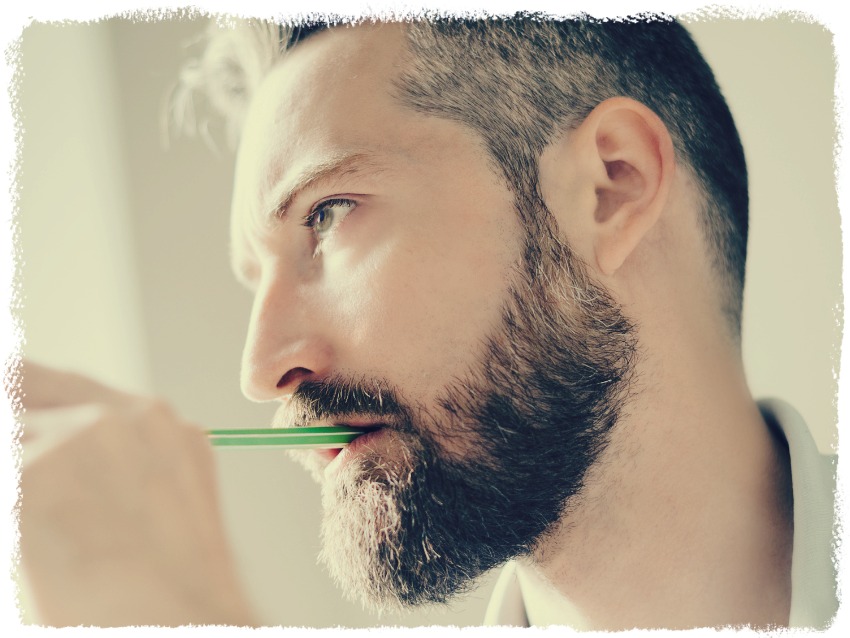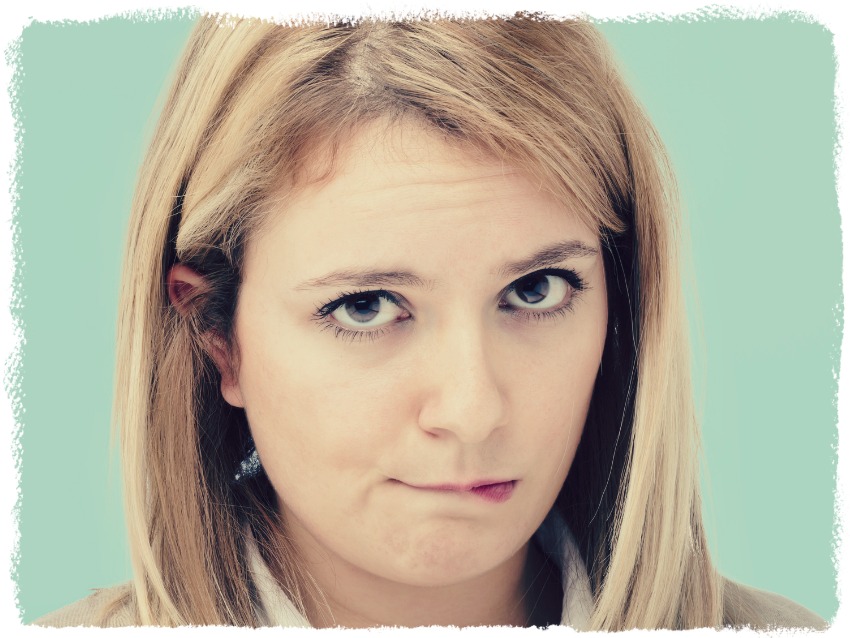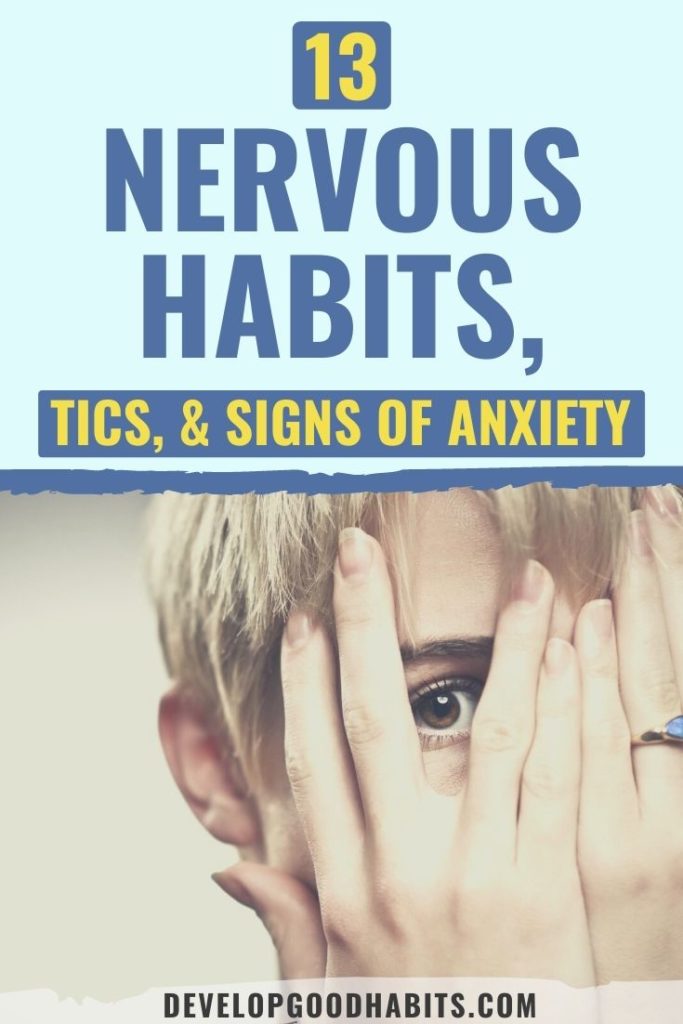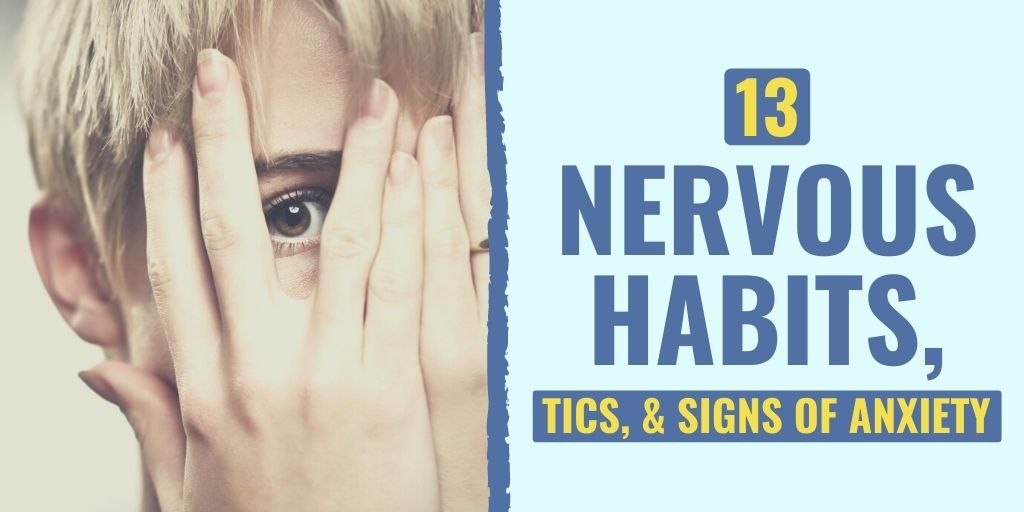There might be affiliate links on this page, which means we get a small commission of anything you buy. As an Amazon Associate we earn from qualifying purchases. Please do your own research before making any online purchase.
Want to learn how to stop fidgeting in a social setting?
Do you often show these signs of nervous habits like:
If you display any sign of these anxiety habits, then you'll want to check out the following list of nervous behaviors with a few simple ways to overcome them.
[See a list of 31 Bad Habits You Should Get Rid of Today]
Okay, let's review this list of 13 nervous habits, tics, and signs of anxiety…
1. Biting Your Fingernails
One of the most common nervous habits is biting your nails. You might not even realize that you do this because once it’s a habit, it will become repetitive and involuntary.
Although it might seem like a self-soothing behavior, it does nothing but cause ragged-looking nails which are susceptible to inflammation and paronychia.
Biting your nails may be an extension of thumb-sucking or even a learned behavior from other family members.
Some ways you can curb this bad nervous habit are to:
[Get More Information on Stopping Nail Biting!]
2. Avoiding Eye Contact
Glancing down and looking away from people you’re talking to may be perceived as a lack of confidence, disrespect or rudeness. Eye contact is a sign of respect (in the west, at least).
If you’re anxious about making eye contact in social settings, here are some things that may help:
[How to improve interpersonal communication]
3. Smoking
Some people light a cigarette when they feel nervous but, as we are all aware of by now, nicotine is an addictive stimulant that actually makes you more nervous. Most smokers feed their bad habit by associating smoking to their breaks from work, which are the only times they can smoke and get away from stressful situations at the same time.
The problem is, this is only a short-term solution to stress. In order to kick your bad smoking habit, maybe it’s time to finally seek some professional help. Try getting hypnotized, pills, nicotine gum, vapor cigarettes or e-cigarettes.
Once you’ve kicked the habit, or reduced your smoking, it’s time to start working on finding another outlet for your stress.
Smoking is also one of the classic “bad habits” that people try to break. If you want to take another shot at getting rid of this habit, then check out this 27-step strategy for changing your bad habits.
And here are a few products that can help you eliminate smoking:
- NicoDerm CQ 21mg Step 1 Nicotine Patches
- Rite Aid Nicotine Patches – Step 1 | 21 mg
- GoodSense Nicotine Lozenge 4 mg

4. Grinding and Clenching Your Teeth
Some people, when nervous will experience bruxism, which is a condition in which you repetitively clench and grind your teeth.
This can happen while you sleep, or while you’re awake. Sleep bruxism usually only lasts for 30 seconds or less but can still have long-term complications.
Over time, if you continue to grind your teeth, it can result in worn-down, loose teeth, cracks, broken fillings, gum recession and headaches (which will actually make your stress worse).
Next time, when you notice yourself grinding your teeth, stop and take some deep breaths instead, and be aware of your facial muscles and surroundings. Stress and anxiety can trigger and exaggerate teeth grinding.
For nocturnal bruxism, seek help from your dentist who can do a bruxism evaluation and who can recommend a bruxism appliance you can wear at night.
But you can also purchase a mouth guard directly from Amazon. Here a few options:
- Plackers Grind No More Dental Night Guard for Teeth Grinding
- Neomen Mouth Guard for Teeth Grinding
- DenTek Professional-Fit, Maximum Protection Dental Guard For Teeth Grinding
Another way to avoid grinding and clenching your teeth is to avoid drinking too much alcohol and avoid chewing gum; both are said to worsen the condition.
5. Rushed Speech
Another nervous habit that you may have experienced at one point or another is rushed speech. This can be harmful because talking really fast may paint you as the stereotypical salesperson.
Another harmful effect is that people won’t understand you because you lose your enunciation when you talk too quickly.
When speaking quickly, you may also disturb the flow of conversations because people will ask you to slow down or repeat what you just said. This could lead to frustration among the group.
If you experience rushed speech from time to time, here are some ways to help:
If this nervous habit sounds familiar, then check out this article to learn 11 ways to improve your interpersonal communication skills.
6. Sucking and Chewing on Pens or Pencils
This is another bad habit that may have started in your early childhood and may be hard to break when you’re an adult.
Pen and pencil chewing and sucking may seem harmless but there are reasons why you need to learn how to curb this bad habit. It’s unhygienic:

If you are used to grabbing a pen and putting it in your mouth, you may, one day grab someone else’s pen (and you don’t know where that’s been). Always remember that germs quickly spread from hands to mouths.
This bad habit is one that not only harms your teeth but also your reputation in the long run. You don’t want to be known as the person in the office that you can’t let borrow a pen.
Here are some ways to help you break this nervous habit:
7. Tapping Your Foot
Tapping your foot is another nervous habit that can be caused by stress. This habit can be seen as a sign of irritation or impatience and may be annoying to others.
If you are trying to break this habit, if you have the option to stand up or remain standing during a conversation or presentation then choose to stand so that you won’t be tempted to tap your foot.
Another way to help you to stop tapping your foot is: when sitting, plant both of your feet firmly on the ground and check on them occasionally. If you have the urge to tap, hold your palms over your legs or try crossing your legs.
8. Twirling and Touching Your Hair
Playing with your hair isn’t always a sign of flirting, it can be known as a nervous habit and a self-soothing behavior. In some cases, hair pulling becomes so severe and can cause trichotillomania, which is the urge to constantly pull hair until it breaks.
Other types of hair playing, more common with women are: tucking hair behind the ears, twirling the hair and smoothing it down or patting the hair. If hair playing is getting a little obsessive and repetitive, it could be a sign of anxiety, stress or discomfort.
If you’re not sure if you have to be concerned, try being aware of the habit and count how many times you touch your hair during stressful situations (meetings, presentations, etc.).
If you notice it’s a problem, keep track and reward yourself every time your number reduces. For severe cases, seek professional help in the areas of stress management or anxiety.
9. Cracking Your Knuckles
This is a very common nervous habit used to relieve stress but there are downsides to cracking your knuckles. First of all, it can be very annoying to your family, friends, and coworkers. It can also have long-term effects like lower grip strength if you are cracking your knuckles too often.
Here are some ways to help your knuckles stay healthy:
10. Touching Your Face
Another unhygienic nervous habit is face touching. Face touching may be seen as a self-pacifying gesture when a person is insecure or hiding something. When people get nervous, sometimes they will feel a need to scratch parts of their face.
If you have problems with this nervous habit, remember, before any meeting or presentation to check yourself in the mirror and assure yourself that nothing is wrong with your face and remind yourself that you won’t have a need to scratch or touch your face.
You can also try holding a pen or do something to keep your hands busy. Another way to curb this habit is to remind yourself that your hands are not clean all of the time and you may be spreading germs from your mouth, back to your hands, and then onto other people.
For worse cases (including chronic acne pickers), trim your fingernails regularly and definitely don’t use magnifying mirrors because that will make you want to touch your pimples even more.
11. Fidgety Fingers
This annoying habit involves everything from tapping your fingers on the table and drumming your hands on your legs to playing with your wristwatch or bracelets and playing with the arm of a chair. This might appear to others that you are someone who is unfocused, bored or dealing with anxiety and stress.
Tips to help your fidgety fingers stay still:
12. Biting Your Lower Lip
Biting your lip is extremely common and, like hair playing, is often considered a sign of flirting. If lip-biting becomes excessive it can have harmful effects. It can cause dry, chapped lips, and bleeding lips due to exposure of the lips to the mouth’s digestive enzymes.

To help you stop your lip biting, take deep breaths to calm yourself before any important meeting. Another great way that might help reduce lip biting is to use a good quality moisturizing lip balm or petroleum jelly. Try using flavored ones (make sure you’re not allergic) and use the taste as a reminder to stop biting your lip.
13. Laughing or Giggling
Laughing or giggling might not seem like a big problem at first, but it can be embarrassing in certain social situations and you might not get taken seriously. Nervous laughter is a physical reaction to anxiety, and in order to stop your giggles, you will need to get help with your anxiety.
Here are some habit tips that you can try:
How to Deal with your Nervous Habits
Stress-related habits like the ones listed above can be embarrassing, stressful and even harmful for your social life and health. It’s important to work on yourself and learn some of the steps above on how to break nervous habits as some of them can have harmful long-term effects.
Once you try the tips we’ve listed above, and get outside help if needed, you will start to feel more comfortable in your own skin and slowly build up your confidence and feel more at ease in social situations.
Confidence breeds confidence, and simply feeling more at ease in social situations will help bolster that confidence in a positive cycle.
Also, if you feel like you struggle with a specific behavior that we just talked about, then check out our article on the step-by-step process to break a habit.
Finally, if you need help with building habits, then check out this nine-step blueprint that walks you through the entire process of creating lifelong habits.)
Like this post?
Then share the below image on your favorite social media website (like Pinterest)!



When I’m in a social situation that makes me uncomfortable I find myself doing #5, rushing my speech, but even worse I find myself saying things that I can’t believe I just said. Even as it’s coming out I know I should throw some duck tape on my lips. I try to take a deep breathe and pause in between to allow my editor to catch up. Sometimes it works.
Holly,
Right on. I feel ya. I have been starting to do a bit of public speaking, and one of the hardest things I have been working on is not “talking too fast”. When I do I say dumb things and fumble, making myself very uncomfortable. It is amazing how much easier it all becomes when you force yourself to slow down and pause a bit while talking.
Chewing on pens and tapping one foot are 2 bad habits I got into when I suffered from anxiety.
Now that I’m over it I still often catch myself doing these 2 things while peacefully working away! The power of habit hey..
I feel ya. Personally I have the exact opposite, but really the same problem. I talk really fast, my words might jumble together and people also miss what I say. Certainly something to be cognizant of. Now that I have been doing public speaking some, trying to keep speech patterns steady and clear can actually give you a boost of confidence in those social situations.
Great post S.J. I’m guilty of #5, talking too fast when I get nervous. I try to take a breath before I answer a question or say something when I’m nervous because it forces me to slow down. Physiology has a lot to do with social anxiety!
Hello! I can say for certain that I’m guilty of #2 #13 and #11, and I’m suspicious of #4 #7 and #8.
Once upon a time I did commit #1 quite often, but it’s mainly subsided. Other things that I find myself often doing out of habit is playing with my wrist and hunching my back in an awkward manner. I always shuffle my feet together and can’t find it in myself to walk properly in public places or when I feel as if I’m being watched.
About #5. I’m quite sure that I sometimes talk too slowly, or too fast and am often asked to repeat myself. Usually I’m simply too quiet, though. I think the longer I talk, the faster and more silent my speech’ll become. Aha… Such an anxious, socially awkward person I am. xD
Hi I have all of the above i feel like I need to escape school and I need to go somewhere quiet so I can calm down
Oh My God, me too.. I deal.. I’m conscience about it and work hard
to control it..it totally blows… Nerves run in our family … ugh
When I’m either in school or out in a big public building I will often find myself, without even knowing I’ve been doing it, tapping my fingers or drumming or tapping my foot, I do it at least 80% of the day and I’ve tried to stop but I can’t
I used to have the same problem my friends started to notice and would constantly ask me what was wrong. I tried getting something to play with like a pen but quickly realized pen clicking was annoying. What I would do was every once and a while like every 2-4 minutes I would look at my fingers and my feet. This helped drastically. If I cought myself I would tell myself that I needed to stop because I realized, who wants to be around someone who is being annoying and constantly drumming their fingers and tapping their feet to make noise that interrupts the conversation? My answer was nobody does.
Oh my god…I do almost all of these.
Rubbing my face stubble on my chin with my fingers, twirling my hair, rushed speech and/or mumbling, chewing pens, and not tapping my foot but I’ll like only lift my heel up slightly off the floor,
Keeping the front of my foot firmly planted on the floor and then I’ll just go up and down repeatedly….Like I’m playing the drums or something.
I am such a mess.
Oh look! A new kind of crazy I have to deal with. Will there ever be an end to it. If I’m not messing with my fingers, I’m biting my lip. If I’m not biting my lip, I’m touching my face. At least I don’t chew my hair anymore. I quit that when I was 8. I quit chewing my nails when I was 12. But there is all this other stuff now. Dear Lord I’m 63, there is no hope is there? Soon I’ll be so old that others will just assume it is a degenerative condition thank God.
Jlea.
Lol. Never “crazy”. Always “eccentric”!
Although you do exhibit some of the nervous habits, you got rid of the biggies when you were little.
I do all of these, all day, every day. it’s uncontrollable. help.
I do all of these…
I’m guilty of #10. When talking with other people I tend to cover my mouth or itch my acne spots or put my lower lip in my mouth. I’ve tried using the advice but nothing seems to be working. Any other ideas?
This could be a tough one. It seems like it is something that is ingrained on a subconscious level, and such a small habit. Best advice I can give is to replace it rather than just try to get rid of it. Perhaps something like spending month (oplus consciously folding one hand over the other when speaking to others. When you feel the urge to scratch or cover your mouth, squeeze your hand to acknowledge feeling. It is always easier to “replace” bad habits than to simply try to get rid of one, similar to the method of chewing gum when you feel like smoking, for people quitting smoking.
i bite my fingernails extremely often, and i also bite the inside of my cheek. does anyone else do this? other things i do: bounce my feet up and down, play with my pen, grind my teeth, and glance everywhere as if i am about to be murdered??
I have most of those nervous habits, but I also rub my tongue against my teeth constantly. I was born nervous; you should see my baby pictures! I also have this terrible habit of rubbing my nails with another finger, as if to check to see how my nail feels. It gets so bad that my fingernails hurt when they’re touched. If my hands are excessively dry, especially around my nails, I can’t stop rubbing the skin around the fingertips to check and see how many “sharp” edges are notable. I always feel as if people are judging me for my nervous habits and I try to avoid social situations.
Ctacking yout nails doesn’t cause arthritis,
but otherwise I agree with what you say. I will try to be more aware of these things and stop.
I will definitely apply looking at other face parts instead of the eyes.
#9 leading to Arthritis has been disproven… although it does annoy the hell out of me when my GF repeatedly cracks her knuckles, so focus on that.
I have to completely disagree with one of your solutions to the “bad habit” of laughing – digging your fingernails into your palm. I’ve been doing this for years as a way to cope with being anxious or upset , as the pain gives me something to distract myself. It’s escalated over the years , last night at a party I dug them into my arm, drawing blood, and scratched parts of my skin off. Today it burns , and I look like I’ve been attacked by a cat. I found this article by accident, as I was trying to find a way to stop doing it, but instead found myself reading about how it’s a better idea than laughing – it’s NOT.
I’m a lip biter a cheek biter, a giggler, I rush my speech, I tap my legs, pick at anything on my skin, pull my hair out, and crack my nuckles…. I’m only 17 and half the time I feel like im going to have a nervous breakdown. It never ends but Carmax is my go to!
Is it normal to suck on your hand or arm when you are nervous
When I was was about six and my parents had recently got divorced, I used to pluck my eyelashes (now one eye has less and shorter eyelashes), and then rub them against my lips. Gross, I know, but it eventually went away. A few years ago in the middle of 8th grade, I started a new habit which is even MORE gross. I run my fingers through my hair, finding the most curly and rigid, and just play with it and rip it out, then I smell my fingers. I would really love to stop, but it takes everything out of me not to do it. I’m trying to replace it with a new habit of just rubbing my fingers together something, but it isn’t working. I wish it would stop, but more importantly, I wish I didn’t have anxiety.
I experience seven of these habits. Is that a bad thing?
Not necessarily. They can be common. Might be you have a bit of anxiety, you may want to see what causes that and what you can do about decreasing your anxiety a bit… but nothing is “wrong” with that at all
One of my big problems is chewing on hoodie sleeves and, or strings. I don’t realize I’m doing it, and I always leave at least 3 hoodies in my school locker. It is overly embarrassing, especially when someone comments on it. Being a girl makes it even worse, mainly because high school girls are mean at my school. Another one of my quirks is scrunching my nose. My friends give me cute little nicknames, so that’s my favorite habit. I got chewed out by a teacher for the finger tapping thing once, and when I tried to tell her I could’t help it, I ended up with detention. And in that detention, i ended up having to get the principal called down. It was awful.
I am definitely the lip bitter and knuckle cracker. It’s so hard not to be self conscious around people and uncomfortable. I love being in the presence of my own home — it’s where I feel the most safe and at ease too. Great article. It’s so true.
I do most of those, my worst one is peeling the skin off of my hands until they are sore. or drumming my fingers. or rubbing my fingernails together.
I clench my teeth and also chew on the inside of my cheek,talk too fast,glance around the room,pop my knuckles,lick my lips,and run my fingers through my hair. I have a long way to go. Lol
I usually smoke 10 cig per day but I m feeling that I have to quit but some of problems I will to do it .. i want to quit but not possible for me to do .. suggest me a better way to quit it … actually I started when my gf lefts me so I m not able to leave .may be I quit if she came back but I want to quit right now only ….
Out of the 13 signs, I do 9 of them. It is really tough. I’d observe other people but they don’t seem to do what I do every single day. I even lied a lot of times just to get myself out of social situations. I just don’t feel confident about myself.